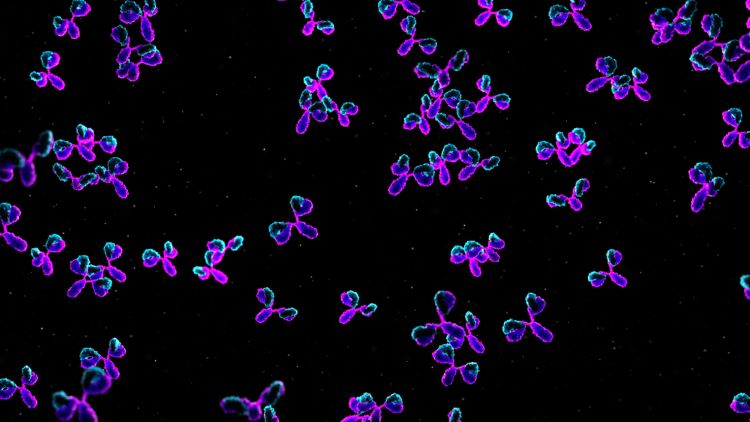Transforming oncology with antibody therapeutics
Posted: 4 May 2023 | Catherine Eckford (European Pharmaceutical Review), Martin Vogel (Janssen) | No comments yet
Martin Vogel, Therapeutic Area Lead for Oncology, Janssen EMEA, discusses the potential of bispecific monoclonal antibodies like amivantamab to address unmet needs in advanced non-small cell lung cancer treatment.


Data announced at the European Lung Cancer Congress (ELCC) earlier last month revealed the long-term efficacy and safety of RYBREVANT® (amivantamab) in patients with post-platinum EGFR Ex20ins-mutated advanced non-small cell lung cancer (NSCLC). Amivantamab was the first bispecific monoclonal antibody (BsMAb) approved in the EU to treat advanced NSCLC with EGFR exon 20 insertion mutations post chemotherapy.
Martin Vogel, Janssen’s Therapeutic Area Lead Oncology for the Europe, Middle-East and Africa (EMEA) region shared with EPR what makes the BsMAb promising for treating this indication.
The data is important because there is “high unmet need for novel and targeted therapies for this patient population” Vogel stated. These patients experience poorer prognosis and shorter survival rates compared to lung cancer driven by more common EGFR mutations.
According to Research and Markets8, the market for bispecific antibodies for cancer is forecasted to grow by $400 million during 2022-2027, due to the increasing prevalence of cancer worldwide. New bispecific antibody generation platforms were identified as one of the major drivers of the market in the next few years.
Why are bispecific monoclonal antibody drugs such as amivantamab promising for this indication?
Amivantamab is the first and only approved treatment in the EU for adults with advanced non-small cell lung cancer (NSCLC) with activating EGFR Exon 20 insertion mutations, after failure of platinum-based therapy.1″
Amivantamab is the first and only approved treatment in the EU for adults with advanced non-small cell lung cancer (NSCLC) with activating EGFR Exon 20 insertion mutations, after failure of platinum-based therapy.1 Existing oral, targeted EGFR tyrosine kinase inhibitor (TKI) therapies provide an effective treatment option for more common NSCLC EGFR mutations but have generally not been shown to be effective in this patient population.2, 3
The treatment was engineered to simultaneously bind with high affinity and inhibit both EGFR and MET, which are two important pathways in NSCLC development and progression.4 Amivantamab targets the extracellular portion of the EGFR and MET receptors. It potentially bypasses the inherent resistance these mutations had exhibited to previously approved TKIs. Overall, the mechanisms of action for amivantamab include ligand blocking, receptor degradation, and immune cell-mediated activity.4


By targeting both MET and EGFR receptors, amivantamab can counteract the resistance that develops. This is due to overlapping signalling pathways of both receptors and the compensatory changes that occur in one pathway following inhibition of the other.4 BsMAb amivantamab was designed to enhance adherence of tumour cells to macrophages and natural killer cells, to improve immune-cell mediated killing of cancer cells.4, 5
Why was the data presented at ELCC 2023 on the bispecific monoclonal antibody significant?
These clinically meaningful results from Cohort D of the CHRYSALIS study confirmed the longer-term safety and efficacy data for amivantamab in patients with an EGFR Exon20 insertion mutation and metastatic NSCLC who have progressed on chemotherapy. These patients face a poorer prognosis and shorter survival rates compared with lung cancer driven by more common EGFR mutations.1
This is significant as the standard of care for common EGFR mutations, such as EGFR TKIs, are generally ineffective against EGFR exon 20 insertion mutations. They are not US Food and Drug Administration (FDA)-approved for these patients due to the lack of benefit.3,4 There is a high unmet need for novel and targeted therapies for this patient population.
What are the current trends in antibody therapeutics?
The next wave of lung cancer innovations includes addressing challenging targets with novel chemistry and modalities and pursuing novel targets for solid tumours”
The next wave of lung cancer innovations includes addressing challenging targets with novel chemistry and modalities and pursuing novel targets for solid tumours. In addition, immuno-oncology, or identifying how to leverage a patient’s immune system, is a key capability and part of our focus on patients with advanced cancer and on cancer interception.6
Precision medicine also offers the opportunity for more effective treatments targeted against the biological mechanisms causing disease, rather than the usual trial and error approach.7 Such an approach has the potential to optimise treatment outcomes for patients and improve quality of care.
References
1. Garrido P et al. Long-term efficacy, safety and predictors of response to amivantamab among patients with post-platinum EGFR Ex20ins-mutated advanced NSCLC. ELCC 2023. Oral Presentation JGN-75414.
2. Nan X, Xie C, Yu X, Liu J. EGFR TKI as first-line treatment for patients with advanced EGFR mutation-positive non-small-cell lung cancer. Oncotarget. 2017; 8(43): 75712–26.
3. Hou J, Li H, Ma S, et al. Z. EGFR exon 20 insertion mutations in advanced non-small-cell lung cancer: Current status and Perspectives. Biomark. Res. 2022; 10(1).
4. Byoung Chul C et al. Amivantamab, an Epidermal Growth Factor Receptor (EGFR) and Mesenchymal-epithelial Transition Factor (MET) Bispecific Antibody, Designed to Enable Multiple Mechanisms of Action and Broad Clinical Applications. Clinical Lung Cancer. 2022; 24(2): 89 – 97.
5. Vijayaraghavan S, Lipfert L, Chevalier K, et al. Amivantamab (JNJ-61186372), an FC enhanced EGFR/CMET bispecific antibody, induces receptor downmodulation and antitumor activity by monocyte/macrophage trogocytosis. Mol. Cancer Ther. 2020; 19(10): 2044–56.
6. Finn OJ, et al. Immuno-oncology: understanding the function and dysfunction of the immune system in cancer. Ann Oncol. 2012; 23(8): 6 – 9.
7. Personalized medicine at FDA. [Internet] Personalized Medicine Coalition. 2021. [cited 2023Apr. Available from: https://www.personalizedmedicinecoalition.org/Userfiles/PMC-Corporate/file/Personalized_Medicine_at_FDA_The_Scope_Significance_of_Progress_in_2021.pdf.
8. Global Bispecific Antibodies for Cancer Market 2023-2027. [Internet] Research and Markets. 2023. [cited 2023Apr]. Available from: https://www.researchandmarkets.com/reports/5557994/global-bispecific-antibodies-for-cancer-market?utm_source=GNOM&utm_medium=PressRelease&utm_code=9st6hf&utm_campaign=1830556+-+Global+Bispecific+Antibodies+for+Cancer+Market+Report+2023-2027%3a+Increasing+Prevalence+of+Cancer%2c+Advantages+of+Bispecific+Antibodies+Over+Monoclonal+Antibodies%2c+and+Strong+Pipeline+Drives+Growth&utm_exec=como322prd.
About the author
Martin Vogel is Therapeutic Area Lead Oncology for Janssen Europe, Middle-East and Africa (EMEA). Martin drives the overall oncology strategy for the region, supporting activities around unmet patient needs and access into Janssen’s global development plan.
Catherine Eckford is Editorial Assistant at European Pharmaceutical Review.
Related topics
Anti-Cancer Therapeutics, Antibodies, Big Pharma, Biologics, Biopharmaceuticals, Clinical Development, Clinical Trials, Drug Development, Drug Safety, Research & Development (R&D), Therapeutics








